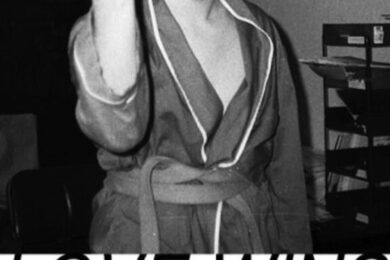Kim Thompson’s death has left the comics world with a hole in the heart. The Fantagraphics co-founder, who died in June, was responsible for shepherding an astonishing amount of talent into the comics reading public’s eye line, as well as ensuring through his translations that European artists such as Joost Swarte, David B, and Lewis Trondheim could be enjoyed by English speaking audiences. I simply can’t imagine what kind of comics fan I would be if I’d never been given the opportunity to read Epileptic or It Was The War Of The Trenches or I Killed Adolf Hitler or Donjon or on and on and on. And not to mention what the scene would be like without work such as Los Bros Hernandez’s Love and Rockets, Daniel Clowes’ Eightball, Charles Burns’ Black Hole and Chris Ware’s Acme Novelty Library, all of which Thompson published and encouraged to grow and to thrive. When I was very little and first getting into reading comics through the superhero series I used to voraciously devour, Fantagraphics books used to intimidate me. Staring down from the shelves of Waterstones with their weird, black and white covers and angular protagonists. A big wide, grown-up world of sex and humour and drugs and music that I wasn’t quite ready for yet. None of it disappeared though, and when I finally got round to enjoying underground and alternative cartooning it felt like there was no limit to the sheer amount I could absorb, and the Fantagraphics logo was a guarantor of excellent presentation and thought provoking material. It still is and a large percentage of the stuff we review in this semi-regular column is published by them. Not out of favouritism, but purely because they consistently put out excellent, fascinating books. Books that are worthy of attention and always seek to move the medium into places it hasn’t been yet. This legacy is largely down to Kim Thompson’s herculean efforts and it’s with the greatest of respect that this month’s column is dedicated to him. Okay, love saves the day. Let’s roll ’em out…
Jacques Tardi & Jean-Pierre Verney – Goddam This War!
(pub. Fantagraphics)
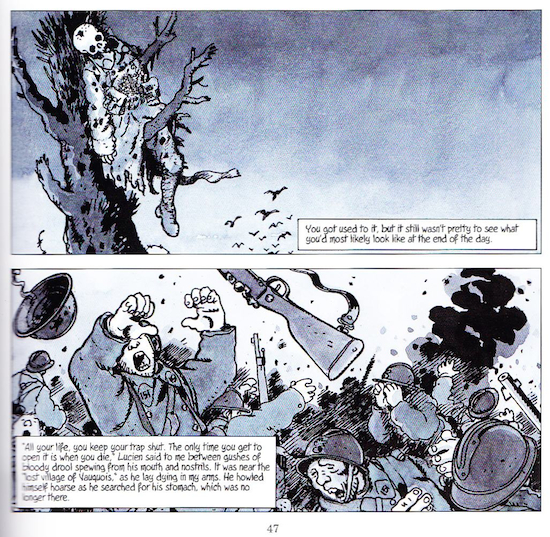
Initially this felt like something of a disappointing follow up to Tardi’s first book on World War One, It Was The War Of The Trenches. Goddam This War! forsakes its precusor’s use of vignettes for a more straightforward approach. Literally, the book begins in 1914 and ends in 1919, methodically taking us through every major battle and engagement through the eyes of its unnamed protagonist. However it’s the inexorability of this approach that gives the book its power as well as its insistence on methodical, rigid three-panel pages. The eye follows the panels down, regular as a marching band, through atrocity after atrocity as the narrator’s stinging, sarcastic humour lambasts the generals, the enemy, his fellow soldiers and everything else his nauseated wit stumbles upon. This dry matter-of-fact approach, coupled with Tardi’s airy, cartoonish renderings of trench warfare give the book a surprising mordant humour. A rictus grin that stays with the reader right up until the final pages. I couldn’t put it down. It’s grimly, horribly compelling. A steady tread into the very bowels of hell itself and master class on dealing with this kind of material in comics form. Mat Colegate
Dash Shaw – New School
(pub. Fantagraphics)
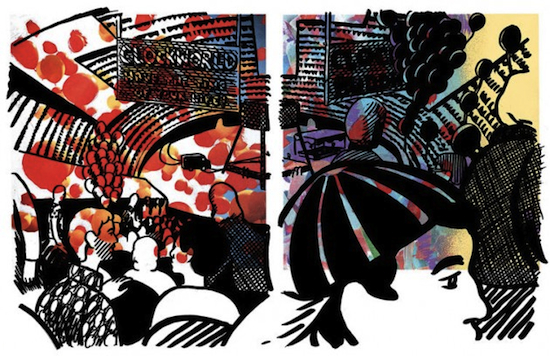
I think I may well be the only person on the planet who didn’t enjoy Dash Shaw’s Bodyworld, the webcomic that went on to be a critical smash on its release by Pantheon a few years back. Something about the clinicality of its approach didn’t quite sit right with its subject matter and left it feeling a bit….erm, gutless (although, of course, this may have been the point. Irony or something, I dunno). Anyway, no such problems with New School. This massive bloody thing is just fantastic. Indeed, the big hardback contains what I reckon to be Shaw’s best work so far. Two brothers find themselves on the mysterious Island of X and are drawn to a giant theme park where the population work. What starts as a journey of acceptance and learning eventually leads to a riot of hallucination, vandalism, crude graffiti and shoplifting as the boys’ disillusionment with their new world causes them to lash out against it. Shaw’s work here is exceptional. The panels appear to have been rendered in black sharpie. Thick, impenetrable lines and inky chasms crawl and flip across every page, although this seeming crudeness leads to absolutely no slacking in expressiveness, which is no mean feat. However it’s Shaw’s use of colour that really cracks the cross bar. As soon as the boys reach X, he starts slathering his panels with big, broad strokes of coloured ink, paying little attention to the lines, but giving each page a confident song of its own. This grungy hallucinatory quality gives the book a kick to go with its heft and its eventual denouement is as strange as it is satisfying. It also contains one of the best scenes of public drunken vomiting in front of strangers who don’t speak your language I have ever seen. Absolutely essential. Mat Colegate
Warren Ellis with Various Artists – Doom 2099
(pub. Marvel)
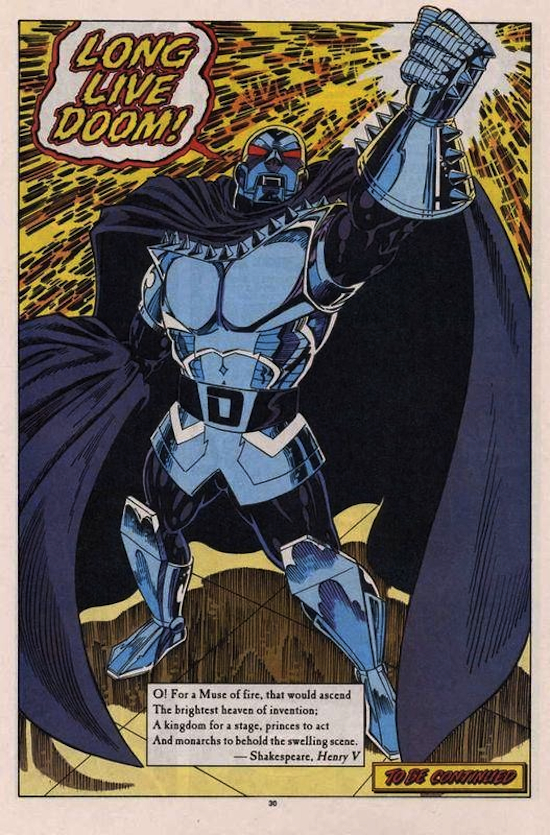
So yeah, this came out a while ago, but I’ve only just got round to reading it and in the interests of not presenting y’all with an indie comics ghetto this month I thought it might be fun to tackle something a little more mainstream, especially as said mainstream item spotlights everyone’s favourite genocidal, Latverian dictator and Fantastic Four foe, Victor Von Doom! IN THE FUTURE! I love me some Doom, I do. I’ve never been to sure what his superpower really is apart from vague magic skills and a proclivity for bellowing his own name a lot, but he has a great look, great tortured origin and, yeah, he shouts his own name A LOT, which is always a winner in my book. In this thrilling instalment, taken from Marvel’s ill-fated 2099 initiative in which they, well, stuck some of their heroes in the year 2099 and had them have a big fight, Doom becomes president of the United States in a not very bloodless coup and sets about saving the environment, disbanding big corporations, and legalizing drugs. In short, it turns out that he would be better named Victor Von Dude. Seriously, the man is a rivet faced baller. It all goes tits up, of course, but it gives Warren Ellis a chance to start polishing the techno-speak gobbledegook that he would go on to perfect with series like Transmetropolitan and a fabulous opportunity to stick barely appropriate high-brow quotes from the likes of Antonin Artaud, Thomas Paine, and (of course) Nietzsche at the end of each chapter. It’s pretentious, silly, gross and puerile and I loved every bit of it. Plus, it features the sentence “…he exults in the jeweled silence of victory” which is something I shall make it my business to do at least once a week from now on. Like, after a particularly successful hanging out of my washing. Or a nice pie. Mat Colegate
Jeff Parker & Jonathan Case – Batman ’66
(pub. DC Comics)
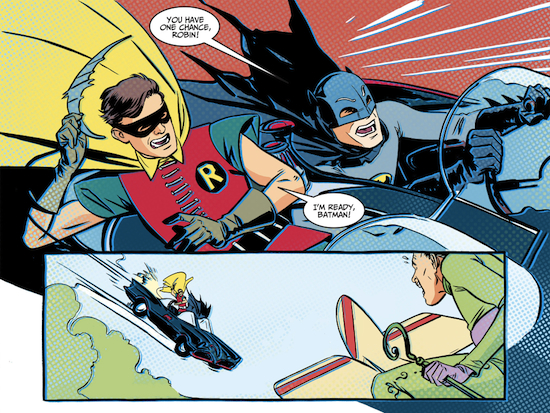
If, like me, you grew up thrilling to the adventures of Adam West and Burt Ward’s Batman and Robin in the camper-than-the-Millets-Summer-sale 1960s Batman TV show then Holy Retromania, chum, is there a comic out there for you. Batman ’66, by Jeff Parker, with art by Jonathan Case, is a just launched DC title featuring stories inspired by that very same big happy smirk of a series and it’s everything the adventure lover could wish for. Ridiculous sound effects! Mock serious voice overs! Death traps! Batman drinking a healthy glass of milk! It’s got the lot, right down to the mimicking…of…the…Frank…Gorshin…Riddler’s…speech patterns! Special mention has to go to Case’s art which captures the lighter-than-laughing-gas feel of the TV series perfectly. His colouring on this book is incredible: a glorious mix of of digital effects, neon ink washes, and big, bold stippling that nails the brash pop-art feeling of the show perfectly. I don’t know why more DC superhero comics aren’t like this one: a one-off adventure, with no complicated continuity issues to alienate new readers and no gormless, pointless violence. Just a terrifically paced, fun adventure strip for the young and the young at heart alike. I can’t wait for the next instalment: same Bat time, same Bat channel. And if it features the Bat Shark Repellent then that’s ‘Comic of the Year’ in the bag. Bravo, sirs. Mat Colegate
Pierre Gabus & Romuald Reutimann – District 14
(pub. Humanoids)
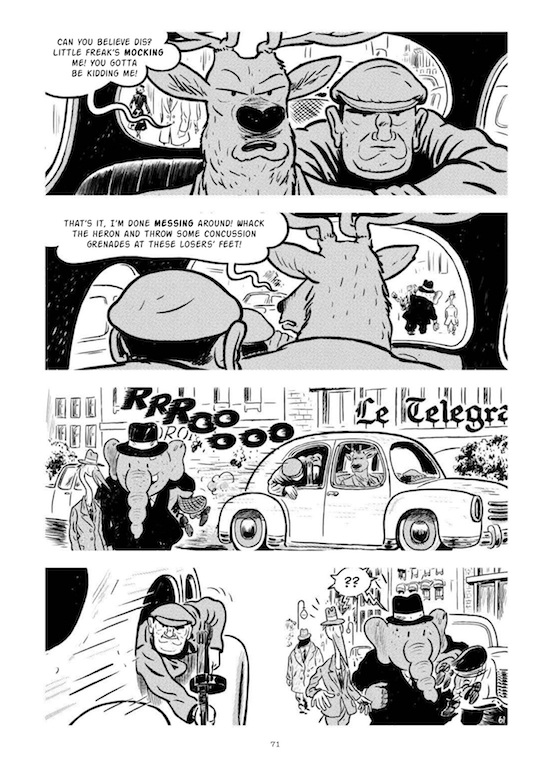
Anarchist elements and elephants, a stag gangster with a penchant for chopping off limbs, people’s hero Tigerman, superhero cat Voltère, and a psychic-frequenting ace journalist beaver are just some of the denizens of this corrupt and chaotic sector. And let’s not forget the helpful extraterrestrial neighbor. District 14 takes us through a complex, mysterious world where spies and kidnappers lurk amidst the war between politics and freedom of the press, all the while offering convincing multi-angled looks at exposé journalism, protection rackets, and love. The setting seems to be early 20th century New York, the art evoking the time and comics of that time, and the story, told with a good deal of humour, offers plenty of intrigue to keep one flipping fast through the pages. Indeed, at the end of this Season 1, I can hardly wait to find out what happens next in the many loose threads left hanging. Aug Stone
Renaud Dillies & Régis Hautière – Abelard
(pub. NBM)
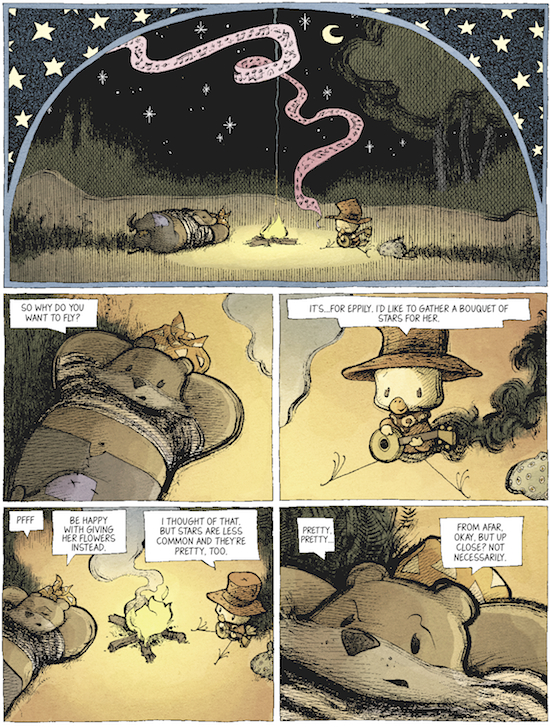
A truly beautiful and sad, sad book. Man, did this hit hard. Many thanks to G for mentioning this in the last Comics Column. Abelard is a young sparrow with a magic hat, living in a marsh near the fictional Kananivka. Content is his surroundings, with his hat offering him up notes of wisdom each day, he nevertheless wonders what the rest of the world is like. Wandering down the river to play his guitar one afternoon, he glimpses the enchanting Eppily and falls in love at first sight. When Abelard offers her a flower, Eppily’s companion tells him flowers aren’t good enough, so Abelard decides to offer her ‘a bouquet of stars’. The day after Eppily’s vacation in the area ends, news reaches the marsh of a flying machine recently invented in America, and Abelard sets off to find and fly this aeroplane to the stars to win Eppily’s heart. He travels with a band of gypsies – enjoying their music, friendship, fortune-telling, and talk of connection to the bountiful night sky – until the night their camp is burnt down. In a tavern he soon meets a curmudgeonly bear, Gaston, whose motto is ‘Life ain’t for the faint-hearted.’ Despite initially refusing to travel with the sparrow, Gaston soon saves the naïve Abelard from a few dangerous situations, and the two settle into an uneasy, then quite loving, friendship. This is a book of possibility and Magic, of the struggle to keep your dreams alive against the despair of the world, and how far you can go on spirit alone. The story and art sparkle with the shimmering stardust mentioned throughout. And the utterly heartwrenching ending will make you feel – more than you’re comfortable with – the true worth of the tale. Aug Stone
Jason – Lost Cat
(pub. Fantagraphics)
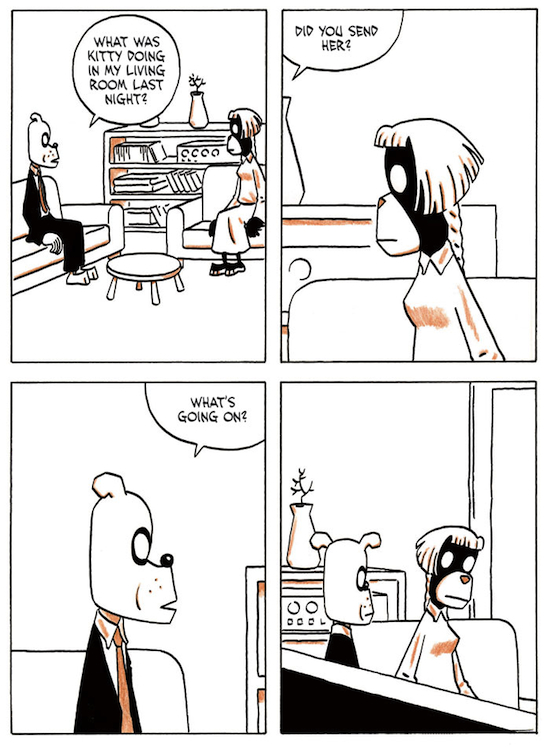
Arguably Jason’s first full-length graphic novel, Lost Cat is a take on the classic detective story told in the Norwegian artist’s singular style. Sparse scenes of black and white, here with minimal yet effective orange-brown highlights, offer up wide space through which the current of the story – its emotions, mysteries, and reflections – may flow. Private investigator Dan Delon quickly finds Kitty and returns the cat to her owner, Charlotte. She invites him in and the two bond over books, past marriages, and work. Dan states a wonderful truth – ‘There’s something special about bookstores that have their own cat.’ Belatedly, Dan calls her for a date but when she fails to show, his inquiries into her life grow suspiciously curious. Meanwhile, he takes a case, of art and love, that proves more dangerous than he’d reckoned. Sticking with it, hallucinations of Charlotte begin to haunt him, and things grow stranger still. Jason offers much of life – big picture searching, minor everyday details, and the connections that stay with us as these wend and weave together. Aug Stone
Matt Kindt – Super Spy
(pub. Top Shelf)
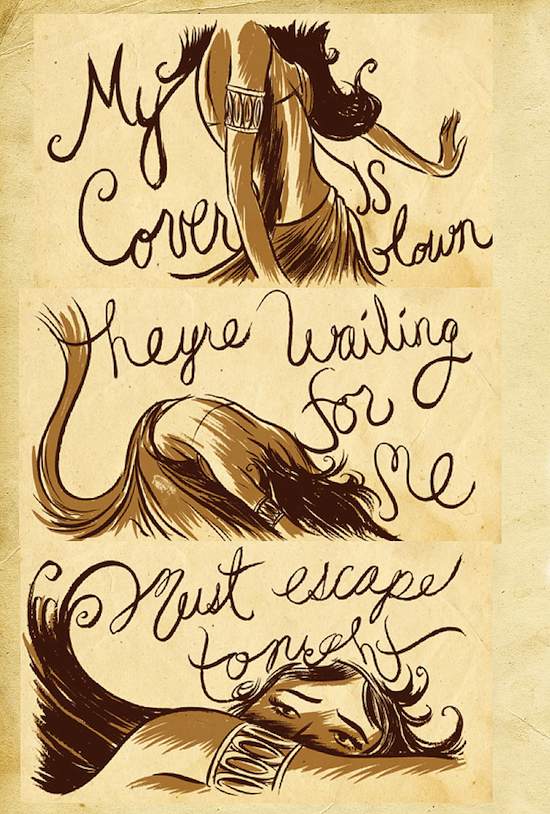
If you like WWII spy comics, this gorgeous new hardcover edition is definitely one to check out. Often beautiful, sometimes gruesome, Super Spy depicts the grey glamour of the intelligence world. Matt Kindt’s fluid lines and mostly monochrome scenes seduce one even further into lives that hide great secrets. The action centers on France, Germany, and Spain (with forays into London and Norway) as we’re shown the everyday experiences of various operatives, with their hopes, fears, and loves, as well as missions both personal and patriotic. The non-linear format in which these vignettes are presented can be somewhat confusing, but never overly so, and thus gives accurate portrayal of such a bustling world. The dossiers are numbered giving one the option to read them chronologically if so desired. Of particular note are the accounts of legendary rogue agent Sharlink ‘The Shark’, whose deadly exploits command respect and whose motives are anyone’s guess. Simply holding this elegant book in your hands is impressive and it continues to delight as Kindt deftly conjures up an expansive story of intrigue and the tolls of war. Aug Stone
Stephen Collins – The Gigantic Beard That Was Evil
(pub. Jonathan Cape)
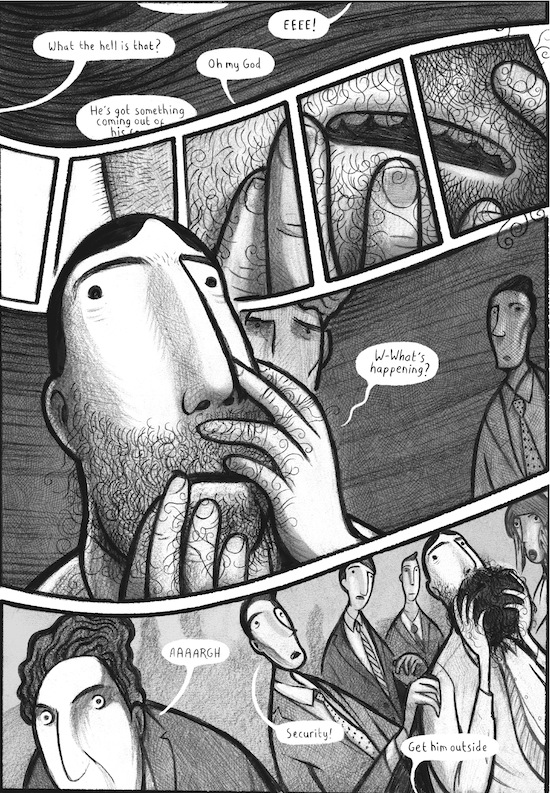
©Stephen Collins
I am not annoyed or surprised that we had the same idea, Stephen Collins and I. In my teens, I wrote about a beard that could not be controlled. I never finished it; the story went unpublished. I’m not suggesting that or anything like it. I wrote about a beard, is all, and I spoke to my counsellor about it. “Why a beard?” she asked. Was it fear of masculinity, approaching responsibility, dread of the uncivilised and untamed?
Well, Mr. Collins? You tell me. You see, he has been more thoughtful on the subject. He has ruminated on it professionally, styling the unruly metaphor into allegory and a fairytale.
The Beard that grows upon the face is not anything in particular, that is what we learn. By this, I do not mean that it is not big, not wild, not flowing, not all consuming, but that it signifies no one thing. The therapist would have been pleased to hear that, meaning many more hours of analysis, more strands to untangle. It is just a Beard with all of those qualities mentioned; qualities that one might find frightful in approaching responsibility, masculinity, or the uncivilised and untamed. As it is, I do not fear them… much. Nor, I imagine, does Mr. Collins.
The face of the man on which the Beard grows is resident on Here, an island. The beard that grows on the face of the man is redolent of There, a place beyond the sea. There is wild and big and flowing and consumes all but Here and the sea that divides them. It is the other place by which Here sets its standards of civility and neatness and inhibition. The Beard is not evil, but neither is There; it’s just easier to think that they are.
The work of Mr. Collins is familiar to those who read The Observer. It is soft and round and, here, it is rendered in black and white – how could a tale of Here and There not be? Its intimations of being a parable are misleading. The story is told in rhyming couplets, which could read as Sunday School instruction, but is, equally, the meter of flights of fancy. This prosody wanders from doggerel to negligible, upward to the succinct and the sublime, although it’s only gilding. It is the story here (Here) that holds, by turns funny and affecting, hinting there (There) at Istvan Orkeny and Edward Lear, told in part as rhyming reportage and fable, monster movie, message, and comical book. See it from a distance and it is one gigantic thing.
I look at my own beard and see something similar: sprouts of soft-tipped brown and black and orange, a cluster of white to the bottom right. I have owned it these seven years.
Reggie Chamberlain-King
Tom Gauld – You’re All Just Jealous of my Jetpack
(pub. Drawn & Quarterly)
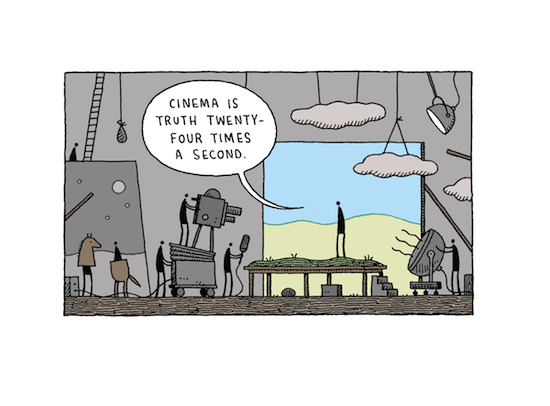
Smart, literate, and not in the least condescending. Completely unlike this review, which must patronise to make any point at all. You’re All Just Jealous of my Jetpack is charming, sweet, and clever. Twice as a clever as that: clever-clever.
A collection of Tom Gauld’s daily cartoons for The Guardian, it defies meaningful review: no narrative with which to engage; no particular demands on artistic facilities of the producer. Its scope is small, but its ambition is big enough. A review of this collection – or any compendium of one-page, frequently one-panel comedy sketches – should amount to no more than a one-word answer (or it would in the hands of a reviewer with greater resolve). Is it funny?
Yes.
Very funny?
Frequently.
Pretty?
Certainly.
But funny?
Very.
Self-satisfied?
The cartoons originally appeared in The Guardian.
But funny?
Certainly.
Pretty?
Very.
Reggie Chamberlain-King


